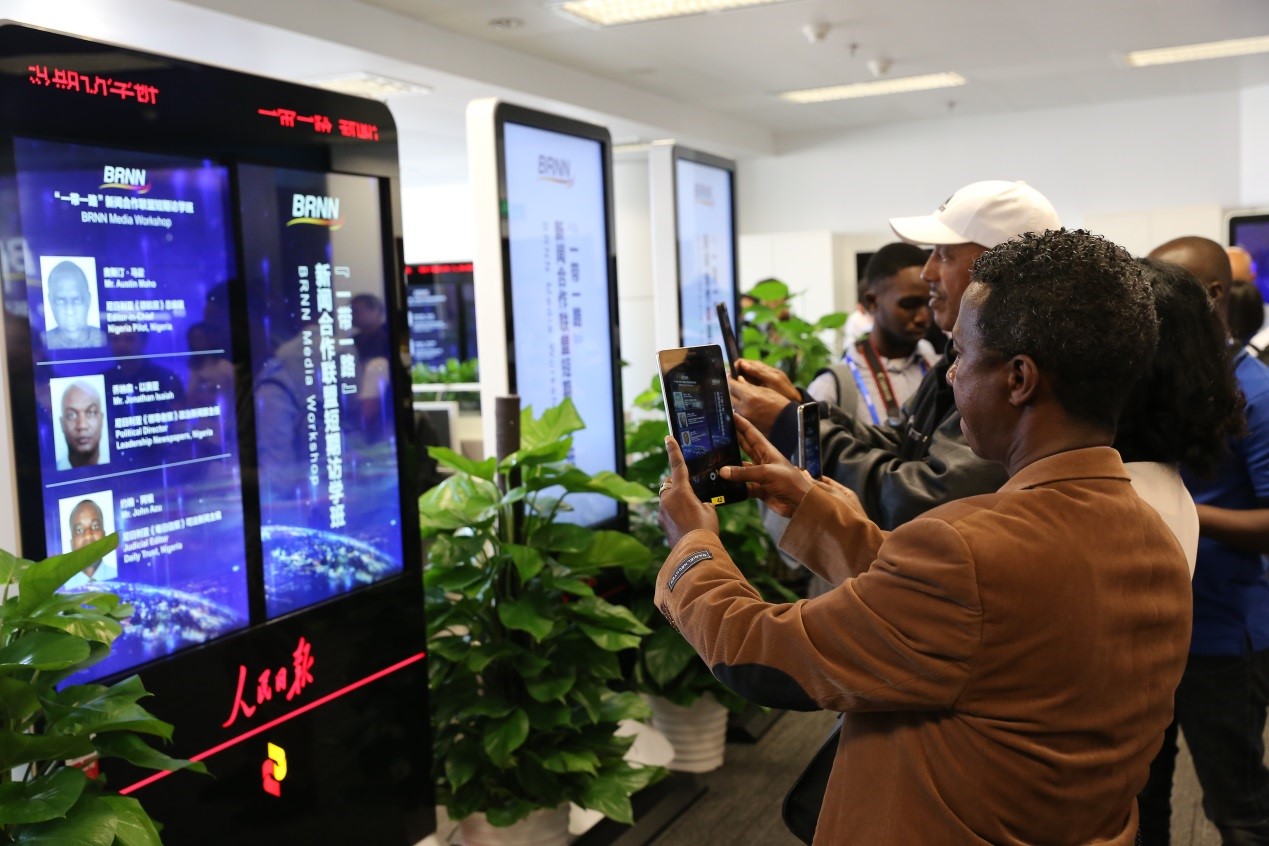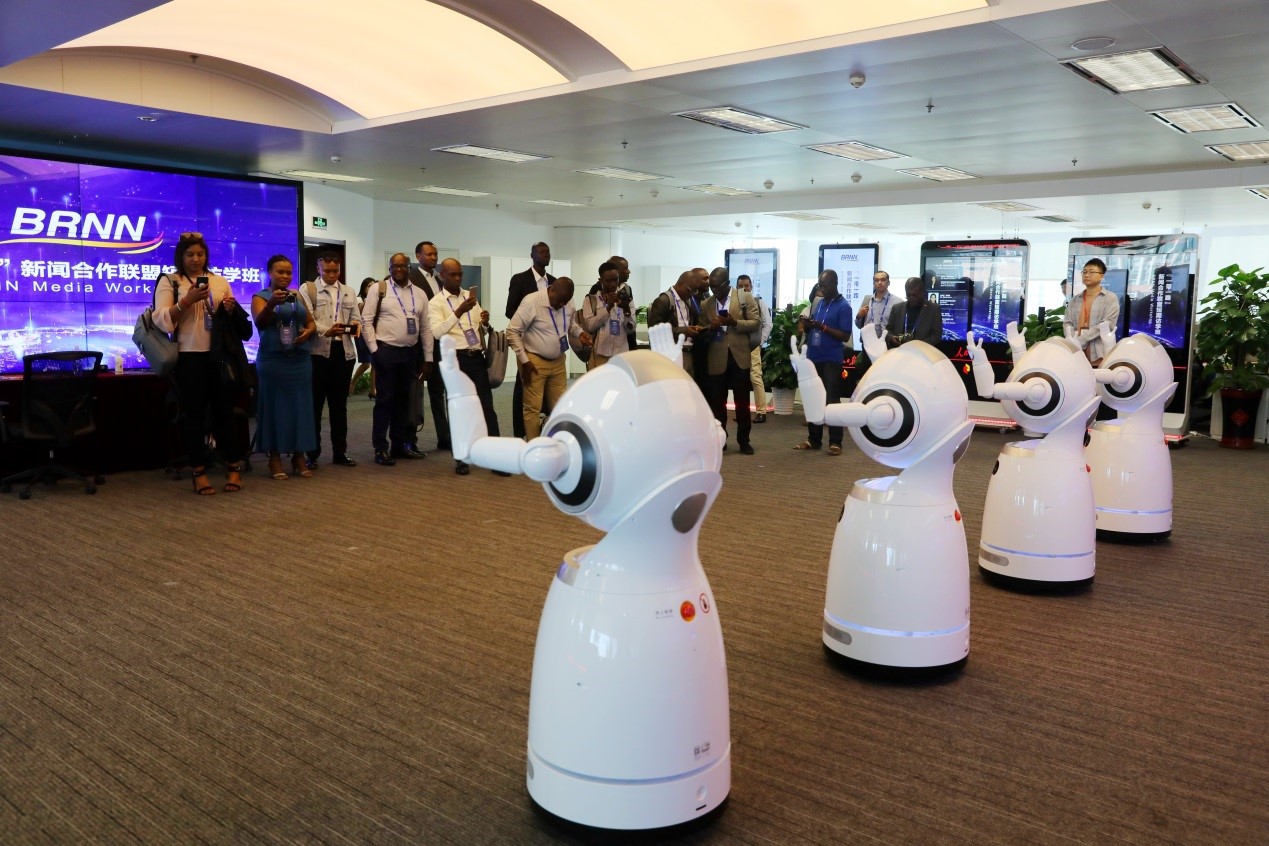


A visiting journalist takes picture of a screen displaying China’s new media technology.(Photo: People's Daily/Chu Jiawei)
A short-term media workshop under the Belt and Road News Network (BRNN) kicked off in Beijing on Sept. 16.
Dozens of senior editors and journalists from Latin America and Africa attended the opening ceremony. They were welcomed by smart robots nicknamed Xiao Meng who opened their arms at the gate of the new headquarters of People’s Daily.
Themed "new era, new ideas, new media, new technology", the workshop aims to present China’s development of new media technology to the visiting editors and journalists.
“It’s amazing to see China’s rapid development in media technology,” said senior editor Berhanu Mussa at Ethiopian Broadcasting Corporation.
Media plays a unique and significant role in the joint construction of the Belt and Road Initiative (BRI). Chinese President Xi Jinping announced at the first Belt and Road Forum for International Cooperation that China will put in place follow-up mechanisms and develop new people-to-people exchange platforms such as a Belt and Road news alliance.
Responding on President Xi’s proposal, the BRNN was established as a key measure to deepen the Belt and Road media cooperation and people-to-people exchanges.
The short-term media workshop is one of the major projects since the official establishment of the BRNN. The BRNN Secretariat originally planned to invite 40 journalists from Africa and Latin America to the workshop, but the number of applicants went far beyond expectation.
After the invitation letters were sent out, the Secretariat received substantial inquiries about the workshop. Some BRNN members also recommended their peers from non-member media outlets to participate in the activity.

Four intelligent robots are dancing to welcome the participants of the BRNN Media Workshop at People’s Daily new headquarters in Beijing.(Photo: People's Daily/Li Guoliang)
In the end, 50 senior editors and journalists from 46 media outlets in 26 countries attended the workshop, including several editors-in-chief of mainstream newspapers, heads of departments, as well as regional coordinating directors and prominent journalists of well-known news agencies.
Marcelo Cantelmi, editor-in-chief of the Foreign Desk of the Clarin Newspaper in Argentina, addressed the ceremony, saying though China is a country on the opposite side of the world for Latin Americans, they should look beyond that.
Substantial evidence proves that China has more worth discovering, and Latin Americans should visit the main cities there to get a real image of the country at a close range, Cantelmi noted.
The media workshop is hosted by the State Council Information Office of China, and was jointly organized by the Secretariat of BRNN (the External Relations Department of People’s Daily) and Communication University of China.
It will run for half a month, with a tight schedule and rich contents including lectures, visits to media outlets, panel discussions and field researches. During the workshop, renowned Chinese scholars and experts in international studies will brief China’s economic and social development and fruitful results in various fields over the past seven decades since the founding of the People’s Republic of China.
The visiting journalists will visit People’s Daily, Xinhua News Agency and other state-owned media to experience and gain a deeper understanding of China’s new media and artificial intelligence application.
The journalists will also go to Chinese provinces including Shaanxi, Zhejiang, Guizhou, and Guangdong for news reporting and investigation to have an authentic experience of China’s achievements in poverty alleviation, ecological conservation, big data industry, urban planning and proprietary intellectual property rights.
“It’s one of the priorities for African media to better tell African stories with high technology and digital devices. Therefore, technology and digital devices will be the key areas for us during the exchanges in the following two weeks,” said Nwabisa Makunga, editor of the Herald and the Weekend Post in South Africa, who attaches high importance on the vital role of the BRNN in media training.
“The workshop that lasts a dozen days is an opportunity for us to know more about China’s politics, economy and culture and go deeper into what makes the BRI a success, and that is what we as media has to do,” said senior editor Thierry Ramasawmy of Mauritius Broadcasting Corporation who has a high expectation toward the workshop.
The visiting journalists agreed that the BRNN provides a platform for equal dialogues and mutual inspiration among the BRI countries and their people. Mainstream media outlets along the Belt and Road will further expand cooperation, innovate cooperation modes, enrich cooperation content and jointly build the BRNN into a platform of news sharing, exchanges and cooperation, as well as communication.
 Fire brigade in Shanghai holds group wedding
Fire brigade in Shanghai holds group wedding Tourists enjoy ice sculptures in Datan Town, north China
Tourists enjoy ice sculptures in Datan Town, north China Sunset scenery of Dayan Pagoda in Xi'an
Sunset scenery of Dayan Pagoda in Xi'an Tourists have fun at scenic spot in Nanlong Town, NW China
Tourists have fun at scenic spot in Nanlong Town, NW China Harbin attracts tourists by making best use of ice in winter
Harbin attracts tourists by making best use of ice in winter In pics: FIS Alpine Ski Women's World Cup Slalom
In pics: FIS Alpine Ski Women's World Cup Slalom Black-necked cranes rest at reservoir in Lhunzhub County, Lhasa
Black-necked cranes rest at reservoir in Lhunzhub County, Lhasa China's FAST telescope will be available to foreign scientists in April
China's FAST telescope will be available to foreign scientists in April "She power" plays indispensable role in poverty alleviation
"She power" plays indispensable role in poverty alleviation Top 10 world news events of People's Daily in 2020
Top 10 world news events of People's Daily in 2020 Top 10 China news events of People's Daily in 2020
Top 10 China news events of People's Daily in 2020 Top 10 media buzzwords of 2020
Top 10 media buzzwords of 2020 Year-ender:10 major tourism stories of 2020
Year-ender:10 major tourism stories of 2020 No interference in Venezuelan issues
No interference in Venezuelan issues
 Biz prepares for trade spat
Biz prepares for trade spat
 Broadcasting Continent
Broadcasting Continent Australia wins Chinese CEOs as US loses
Australia wins Chinese CEOs as US loses